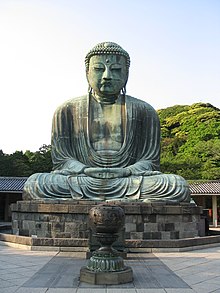Portal:Buddhism
This portal is a work in progress. Please feel free to contribute. Chat with the community in the talk page!
| Buddhism Portal | What is Buddhism? | Indices | Wikiproject |
 Buddhism (/ˈbʊdɪzəm/ BUUD-ih-zəm, US also /ˈbuːd-/ BOOD-), also known as Buddha Dharma and Dharmavinaya, is an Indian religion and philosophical tradition based on teachings attributed to the Buddha, a wandering teacher who lived in the 6th or 5th century BCE. It is the world's fourth-largest religion, with over 520 million followers, known as Buddhists, who comprise seven percent of the global population. Buddhism arose in the eastern Gangetic plain as a śramaṇa–movement in the 5th century BCE, and gradually spread throughout much of Asia. It has subsequently played a major role in Asian culture and spirituality, eventually spreading to the West in the 20th century. According to tradition, the Buddha taught that attachment or clinging is the cause of dukkha (often translated as "suffering" or "unease"), but that there is a path of development which leads to awakening and full liberation from dukkha. This path employs meditation practices and ethical precepts rooted in non-harming, with the Buddha regarding it as the Middle Way between extremes such as asceticism or sensual indulgence. Widely observed teachings include the Four Noble Truths, the Eightfold Noble Path, and the doctrines of dependent origination, karma, and the three marks of existence. Other commonly observed elements include the Triple Gem, the taking of monastic vows, and the cultivation of perfections (pāramitā). Buddhist schools vary in their interpretation of the paths to liberation (mārga) as well as the relative importance and "canonicity" assigned to various Buddhist texts, and their specific teachings and practices. Two major extant branches of Buddhism are generally recognized by scholars: Theravāda (lit. 'School of the Elders') and Mahāyāna (lit. 'Great Vehicle'). The Theravada tradition emphasizes the attainment of nirvāṇa (lit. 'extinguishing') as a means of transcending the individual self and ending the cycle of death and rebirth (saṃsāra), while the Mahayana tradition emphasizes the Bodhisattva ideal, in which one works for the liberation of all sentient beings. Additionally, Vajrayāna (lit. 'Indestructible Vehicle'), a body of teachings incorporating esoteric tantric techniques, may be viewed as a separate branch or tradition within Mahāyāna. (Full article...) |
Text is available under the CC BY-SA 4.0 license; additional terms may apply.
Images, videos and audio are available under their respective licenses.

